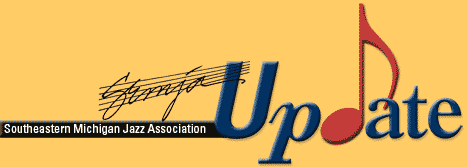

|
|
Recent Recordings by Area MusiciansTimes may be tough, but as we start the new year, it seems that somehow jazz is surviving in our area, even if there have been setbacks. As I look at the batch of recent CDs lying before me, I cannot but marvel at the quality of the music, by masters past and present, that I have just been listening to. Here is a quartet of recordings that testify to the vitality of modern jazz in our area.
The trio tackles well-known pieces like "Do Nothing ‘Till You Hear from Me," which is done at a relaxed and yet propulsive tempo, as well as less often visited compositions such as "Purple Gazelle," from the Afro-Bossa album (done here as a calypso). The arrangements offer much variety, including a virtuosic solo piano version of "Johnny Come Lately," that begins as a solo piano ballad and then picks up tempo, morphing into a virtuosic modern-day stride tune, and then with the rest of the band kicking in, rides out in trio fashion. The ballads are rhapsodic, none more so than "Lotus Blossom." They even manage to find the imagination to create an original arrangement of "Take the A Train" to finish off the recital.
To mix things up, every track has a very different rhythmic pattern; moreover, Felt does not score the instrumental voices in unison, but makes them dance around each other in varying ways throughout the disk.
From the instrumentation one might expect a funky organ group with dueling tenors, ready to walk the bar, but this quartet is anything but that. McMillan plays the Hammond in a thoughtful fashion, more in the manner of Larry Young than Jimmy Smith, and the twin saxophones are lovers not fighters. Although rhythmically complex and driving, as one expects from Siers, this is a group that explores a collection of harmonically and melodically multifaceted improvisational vehicles in subtle ways. Jansson and Kaminski are well matched, individual in tone, complementary but working from a similar tenor tradition. The addition of Belgrave on the Pearson track adds just the right accent to the whole recital.
Without customary bass and drums the two musicians find great flexibility in their joint rhythmic investigations of original compositions, as well as those of Thelonious Monk. The disk reminds us once again of the uncommon musicality of both Detroiters who both managed to develop individual voices from decades of extremely varied musical experiences. While Cox and Walden often exalted in hard driving playing, on this occasion they tended to work in more lyrical realms, happy to explore the intimacy of the situation and surroundings. And yet, for all the modern jazz sensibilities that they brought to this concert, when they finally get to Monk's "Misterioso" it turns out that behind it all is a fundamental mother lode. Both Walden and Cox eschew Monkish paraphrases of the melody and use the theme to explore the history of the blues, ending up with a paraphrase of "After Hours." They then turn around and end with a powerful reading of a Walden original that is very different in tone. Both masters are now gone from us and it is tempting to approach this recital with nostalgic anticipations, but the strength of the music demands more. This is not for background: turn down the lights and listen, as this is even better than it seemed years ago. We must be grateful to Barbara Cox and Marsha Walden as well as Bruce Hutchinson, for preserving this music and offering it for us to hear. |
|||
|
||||
I N - T H I S - I S S U E : |